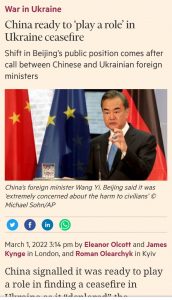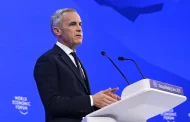If what the highly influential and London based Financial Times is reporting is anything to go by, then the world might have found in China the global player which can undergird a peace process in the violence in Ukraine. According to the March 1st, 2022 edition of the paper which has not been denied after 24 hours, Chinese foreign affairs minister indicated this readiness of China to play that role during a telephone conversation with his Ukranian counterpart, Dmytro Kuleba.
 Without mystifying the Financial Times, it not an ordinary newspaper in that it is well informed and well located in the global system. The implication is that the story which though may not be exclusive to it cannot be dismissed in the light of the cover page lead status it gave it in the global edition.
Without mystifying the Financial Times, it not an ordinary newspaper in that it is well informed and well located in the global system. The implication is that the story which though may not be exclusive to it cannot be dismissed in the light of the cover page lead status it gave it in the global edition.
It is a development many would find unbelievable because of perceived closeness between China and Russia almost to a point of a counter security block but if the violence must be stopped, then China is about the only player with the weight and skills to undergird a peace process in the conflict. Notwithstanding its perceived closeness with Russia, it might have its own lens on the conflict that may not agree with how Moscow sees it. Not being part of the EU or NATO and guaranteed of good influence on Putin, it could pull through a ceasefire and the subsequent negotiation, gaining the leverage that all peacemakers gain from doing so.
An opinion out there appears to be saying that if the Western alliance made the ‘mistake’ of allowing Putin to begin to unfold in Ukraine, it might require no less than a power outside of the West to get Putin off that course.
In any case, all other regions have remained cautious in taking positions on the Russian invasion. Asia is still basically quiet, with India saying in a spectacular statement that the security interests of all conflict parties be privileged. The Association of Southeast Asian Nations, (ASEAN), the regional platform has issued a statement which has been described as classically terse. It said nothing more than expressing deep concern which could mean anything in diplomacy. Latin America is almost the same, with Brazil declaring neutrality. Kenyan top diplomat to the United Nations railed against Russia on the ground that old borders cannot be redecided now along the line Putin has done in Eastern Ukraine. No other voice has challenged the statement but it is unlikely to be Africa’s consensus position. The silence on the statement is being interpreted in some quarters as deference to President Uhuru Kenyatta of Kenya without whose approval his diplomat cannot have made the statement.
 Analysts are drawing attention to the futility of war and the need for a ceasefire. There is no evidence that can show that anybody ever wins any war, it is argued. References are made to how the consequences of war go far than anybody can account for in terms of winners or losers. Certain consequences of war are good for certain people. On the other hand, certain outcomes have disturbing consequences for certain people. That makes war the ultimate paradox and thus the wrong headedness or misleading nature of trying to see war from the point of view of winners or losers.
Analysts are drawing attention to the futility of war and the need for a ceasefire. There is no evidence that can show that anybody ever wins any war, it is argued. References are made to how the consequences of war go far than anybody can account for in terms of winners or losers. Certain consequences of war are good for certain people. On the other hand, certain outcomes have disturbing consequences for certain people. That makes war the ultimate paradox and thus the wrong headedness or misleading nature of trying to see war from the point of view of winners or losers.
The defunct USSR was in Afghanistan in 1979. The United States armed insurgents who engaged the USSR. It was a stalemate until the defunct Empire left. But the US sponsored insurgents then turned their eyes on the US itself, compelling the US to pursue them to their situational homeland in Afghanistan in the aftermath of the 9/11 shock and awe. From 2001 till 2020, the US too was bogged down in Afghanistan, enacting a dramatic withdrawal.
In all those two wars, human beings suffered various dimensions of privations but nobody could be said to have won or been defeated. Invasion of Iraq followed in 2003. The same story of human degradation and unspeakable privations. Yet, neither the US nor the Afghan insurgents could say they won the war. The theatre has moved to Ukraine. In the end, nobody is going to win or lose in a dictionary sense of those words. Some people will win some outcomes but some others will would have lost so much. On the whole, however, even if there is a ceasefire today, the implications of the war would still be unfolding 20 years from now.
For one, memories of the war and the bitterness or fulfillment over the war would have constituted some victims or winners into permanent hostility or endearment of the world in whatever they do. In some cases, no one will be able to trace the consequences of their actions to such sense of hostility or fulfilment arising from this war.
So, the world might have no alternative to a China stepping forward to play the peacemaker’s role that the FT is hinting and giving so much prominence. As some scholars of war are posing it, this war should not have started at all if attention were given to what India called the security concerns of all the conflict parties instead of throwing labels at others. It would be an interesting process to watch by many across the world.




























